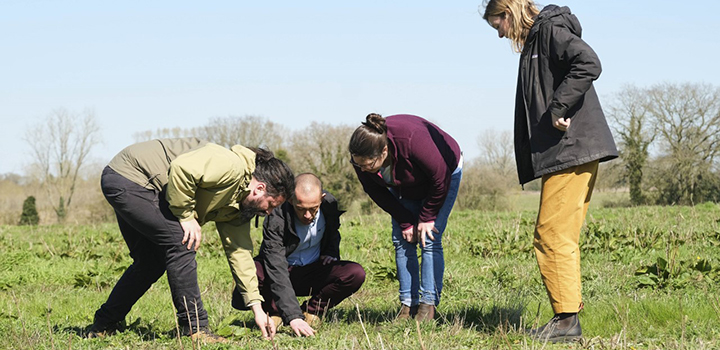Project aims to reduce emissions and increase biodiversity on Ribena blackcurrant farm
By: Communications

A new research project launches today designed to contribute to a carbon neutral supply chain and increase biodiversity on a Ribena blackcurrant farm in Norfolk.
Suntory Beverage & Food Great Britain and Ireland (SBF GB&I), the producer of Ribena, and the University of East Anglia are embarking on a project to reduce greenhouse gas emissions from the growing of blackcurrants through regenerative farming practices.
In collaboration with Suntory Holdings Limited and Soil Ecology Laboratory, the ambitious project will take place across much of the 60 hectares of blackcurrant production at Gorgate Farm in Norfolk, which has been growing blackcurrants for Ribena since the 1950s.
As part of Suntory Group’s overall ambition to support crop resilience and reduce carbon emissions from its supply chain, this work aims to reduce three greenhouse gas emissions from blackcurrant production and improve soil health so that it can support plant resilience and increase the amount of carbon it can store.
Rosie Begg, second generation blackcurrant grower at Gorgate Farm and the research lead, said: “Ribena is an iconic brand with an 85-year history of supporting the UK blackcurrant industry, driving innovation in blackcurrant farming as well as the conservation of farmland.
“Challenging climatic and economic conditions over the past few growing seasons have inspired me to investigate, and start to adopt regenerative farming practices, that will allow us to grow sustainably as well as reduce greenhouse gas emissions.
“It’s thrilling to be able to bring in national experts and researchers to support this ambition and to be so supported by our customer. Collaborating with Suntory’s global team will enable us to share our learnings and learn from regenerative projects all over the world.
“Soil truly is the most important and essential ecosystem, its linked to every function on the planet. The aim is by focusing on soil biology restoration, we can allow natural processes to support blackcurrant production without so much intervention, benefiting both the environment and blackcurrants we grow substantially.”
Brian Reid, Professor of Soil Science at UEA’s School of Environmental Sciences, said: "It is incredibly exciting to be collaborating on this project. For several years we have pioneered approaches to assess soil carbon storage permanence and the relationships that exist between soil carbon and soil biodiversity.
“This support from Suntory enables a real-world opportunity to apply our science and quantify the benefits of regenerative agriculture interventions."
The project will focus on minimising external inputs while improving soil health, plant nutrition and environmental protection through:
• Sap sampling to better understand and optimise blackcurrant plant nutrition – the theory being macro and micro-nutrient imbalances affect plant resilience and attack by pests and diseases;
• Utilisation of novel and organic inputs (both fertiliser and crop protection) to replace conventional inputs;
• Creation of diverse alleyway swards to feed the soil, increase carbon;
• Improvements to soil health and carbon sequestration through the utilisation of compost extracts to restore soil microbiology.
Harriet Prosser, agronomist at SBF GB&I, said: “This project represents a real shift away from more conventional practices. The principles are backed by credible science but have yet to be commercially tested in more mainstream perennial fruit systems.
“The aim is to produce quality data that will enable us to scale up these principals to the wider industry. We’re not just tackling greenhouse gas emissions, we’re looking to increase the amount of life, in our soil, in turn improving soil health and fertility which benefits the blackcurrant itself.
“This trial is part of a global regenerative agriculture initiative led by Suntory Holdings Limited, and draws on expertise from industry and academia, it aims to facilitate healthy plant growth and re-establish a more natural soil food web.
“This is a really ambitious project - we want to do this important work while maintaining a commercial yield of high quality juicy British blackcurrants that will go into making Ribena for the next 85 years.”
The pilot project will launch in April 2023, backed by investment from Suntory Holdings Limited for at least three years. However, it is hoped that the principles and learnings developed will lead to a step change in sustainable production not just in blackcurrant but for many other crops well into the future, creating a blueprint that could support other growers as they start their regenerative agriculture journey.
Brian Golden, Senior General Manager at Global Supply Solutions, Suntory Holdings Limited, added: “This is another milestone in the series of regenerative agriculture pilots we at Suntory Holdings are excited about and investing in.
"Thriving agricultural systems are crucial to our business and we place regenerative agriculture as one of the core solutions in transitioning to sustainable agricultural practices across all markets. This project in the UK will allow us to further our collaboration with various supply chain partners to procure more sustainably and to decarbonise."
The project will use the widely adopted Cool Farm Tool to quantify the on-farm greenhouse gas emissions and soil carbon sequestration. This will ensure accurate and consistent carbon reporting. It is hoped the wider results will be reported via peer-reviewed scientific papers charting the project’s findings.
Related Articles

Nurses worldwide rely on intuition to triage patients
Nurses around the world use intuition to work out how sick a patient is before triaging for treatment according to new research from the University of East Anglia.
Read more
UEA nursing apprentice’s sky-high dive for Alzheimer's and Dementia awareness
On Sunday 24 September, University of East Anglia (UEA) nursing apprentice Francessca Turrell will be taking part in a charity skydive for Alzheimers Society, a UK care and research charity for people with dementia and their carers.
Read more
New book to focus on Norwich’s medieval logos
Logo Rewind: Trademarks of Medieval Norwich is a new book from UEA Publishing Project, in collaboration with CreativeUEA and featuring the work of Darren Leader, which will focus on the stories of Norwichs medieval merchants marks found in different locat
Read more